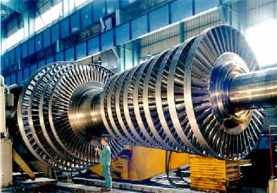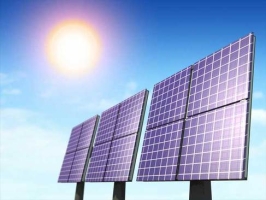Malaysia
Malaysia eyes more gas-fired power plants
Malaysia plans to call for bids by as early as the first quarter of next year for gas-fired power plants in Peninsular Malaysia.
Malaysia eyes more gas-fired power plants
Malaysia plans to call for bids by as early as the first quarter of next year for gas-fired power plants in Peninsular Malaysia.
Vietnam’s power requirement to rise seven folds to 135,756 MW by 2030
But the country appears incapable to meet the soaring demand as only 30% of the $40 billion investment capital needed for the development of a power sector less reliant to hydropower by 2015 is currently met.
Vietnam will fail to deliver over 200 carbon development projects scheduled in 2013
As little as 20 % of projects may be done due to lack of carbon credits. The country still faces the perennial problem of long process of achieving Emission Reduction Purchasing Agreement (ERPA), says Dang Thi Hong Hanh, deputy executive officer of Energy Environment Climate (EEC).
Hydro Fail: What Sarawak Energy learned from failed mini-hydro projects
Hydro power seems like the simplest form of renewable power to install – but the devil is in the details as some failed mini-hydro projects at Sarawak Power shows.
Malaysia’s largest hydroelectric plant starts operation in the next few days
The RM7.5 billion Bakun hydroelectric project with an installed capacity of 2,400 megawatts will be fully operational on October 4, revealed Sarawak Energy Berhad (SEB) CEO Torstein Dale Sjotreit.
The Base load is dead so it's time to park your engines
Power giant Alstom is staking its future range of engines on the belief that operators will need more flexibility in the operation of their power plants and has responded with a new rating of KA26 engines with some rather interesting characteristics.
GE moving fast to repower Japan post Tsunami
The lights are coming back on in Tokyo, thanks in part to the extremely fast installation of GE gas turbines which are plugging the energy gap left by the closure of the Fukishima nuclear plant.
Tenaga to pay $990M more for power generation after gas shortage
Malaysia's Tenaga Nasional expects to pay 3 billion ringgit or $990.6 million in extra costs for power generation this year if the current gas shortage is not resolved, reports Reuters.
Malaysia's Seda revises quota for renewable energy sources
Malaysia's Sustainable Energy Development Authority will be revising downwards the quota for all renewable energy sources for the remaining of this year.
Tie ups to allow Malaysian firms to tap India’s energy sector
With the Indian power sector projected to attract a total investment of US$300 billion or RM885 billion by 2017, Malaysian power companies are ideally placed to profit from the opportunities.
Petronas to raise $400M for for Malaysian power plant
Petronas Gas needs to raise MYR1.2 billion or $400 million to finance the construction of a 300MW gas-fired Kimanis power plant in Sabah, Malaysia.
Malaysia's Energy Efficiency Master Plan Soon
The National Energy Efficiency Master Plan (NEEMP) that will strategize Malaysia's efforts in addressing energy security, global warming and climate change issues, has been finalised. Energy, Green Technology and Water Ministry Secretary-General Datuk Loo Took Gee said the Peer Review Team from the Asia Pacific Economic Cooperation (APEC) had also reviewed the plan. "We take positively their comments and confidence in this master plan. It would be submitted to the Cabinet very soon," she said when launching the Asean Energy Management Scheme (AEMAS) and Conference here Tuesday. With the NEEMP, she said, Malaysia would have a comprehensive and systematic approach towards energy efficiency. "The master plan would also complement many energy efficiency initiatives that have been carried out in the past with notable achievements," she said. Malaysia is committed to reducing emissions intensity of its GDP by up to 40 per cent by 2020. On AEMAS, Loo said the establishment was to increase energy efficiency in industries in the ASEAN region through training and accreditation of energy managers on a large scale and the certification of energy end-users. She said the main objectives of the AEMAS were to reduce energy consumption in the industrial sector in ASEAN, to reduce emissions of greenhouse gases in ASEAN, and to increase the professional standing of accredited energy managers. "The launch of the Malaysian Chapter of AEMAS marks an important milestone that will support our transition to an energy efficient nation, as we place priority on the need for human capital competency and the drawing up of a code of practices to use technology effectively. "We are confident that AEMAS has the capability to facilitate such efforts which will create the critical mass required for human capacity in promoting energy efficiency and conservation to ensure energy security for our country," she said. Loo said the government had established the Green Technology Financing Scheme (GTFS) with a RM1.5 billion fund to provide soft loans with an interest subsidy of two per cent to companies. "It is for companies that supply, utilise and promote green technology, including energy efficiency and conservation," she said. Under the GTFS which commenced on Jan 1, 2010, suppliers are able to obtain loans of up to RM50 million and for consumers up to RM10 million.
Malaysia's renewable energy implementation on track for September
Malaysia's Renewable Energy Act is on track to be implemented on September 1, upon the setting up of the Sustainable Energy Development Authority.
Malaysia approves electricity tariff restructuring for Sabah, Labuan
The Malaysian government has approved the electricity tariff restructuring for Sabah and the Federal Territory of Labuan with effect from July 15.
Greening Malaysia’s shipping sector : A call for action
Shipping : Malaysia’s lifeline Shipping, which transports 90 per cent of global trade, holds economic and environmental advantage over other modes of transport. Hence, the reliance on ocean shipping is expected to rise with increasing trade volume. Seaborne transportation is a key facilitator of Malaysia’s trade-oriented economy. This is underlined by the fact that an estimated 95 percent of the country’s trade is carried via seaborne means. Malaysia contributed 12.44 mil. DWT (deadweight tonnage) or 1.07% to world merchant shipping tonnage, and in MISC, it has the world’s largest owner-operator of LNG tankers.
Robert Bosch to produce solar panels in Malaysia
Robert Bosch plans to invest MYR2.2 billion or US$727.4m to set up a solar panel manufacturing plant in Penang, Malaysia.













 Advertise
Advertise



















